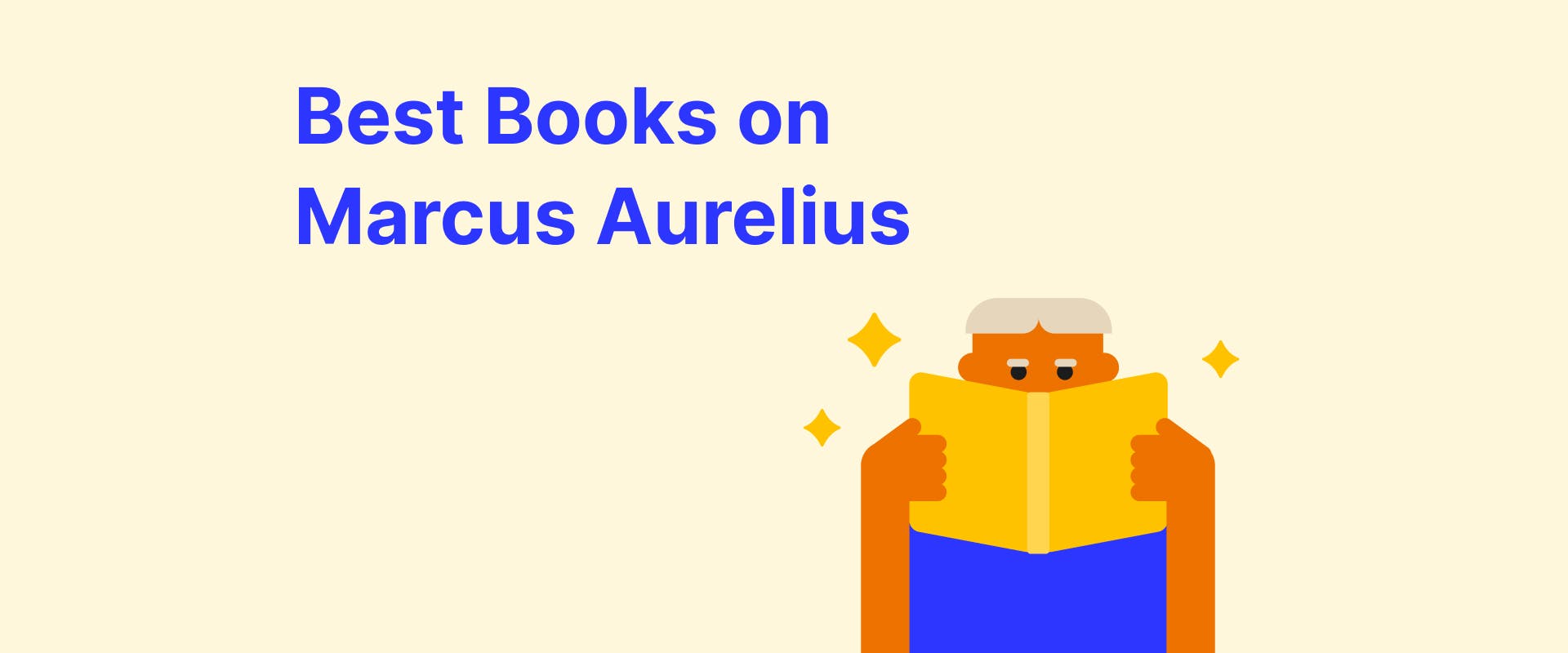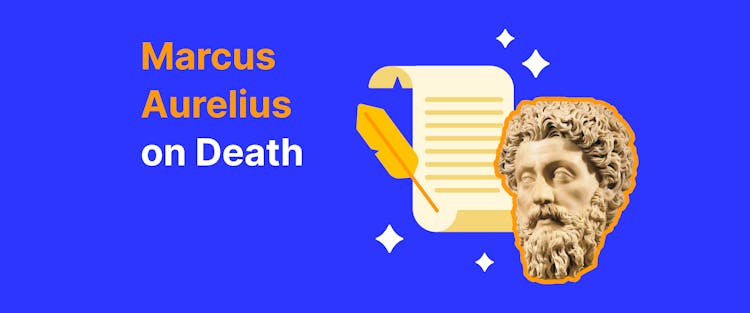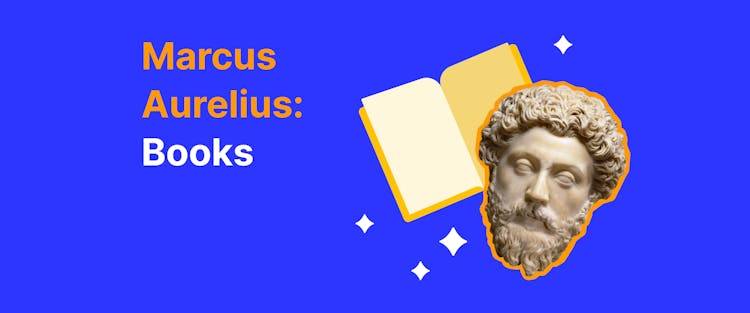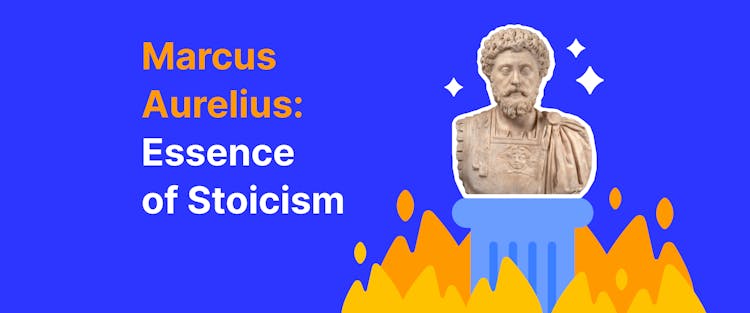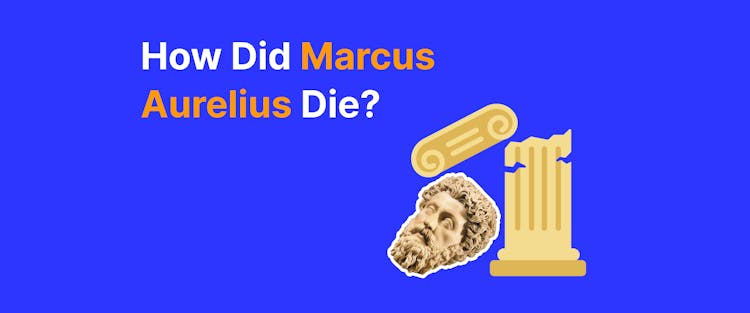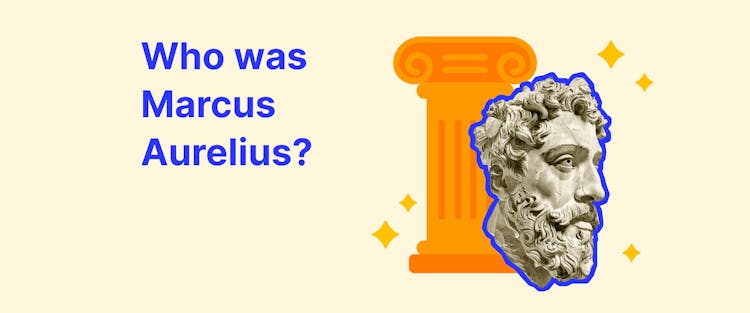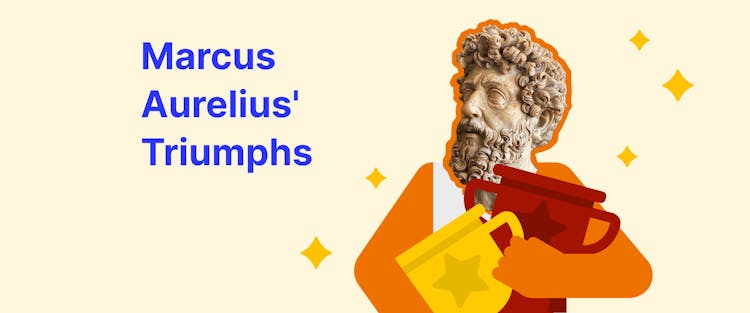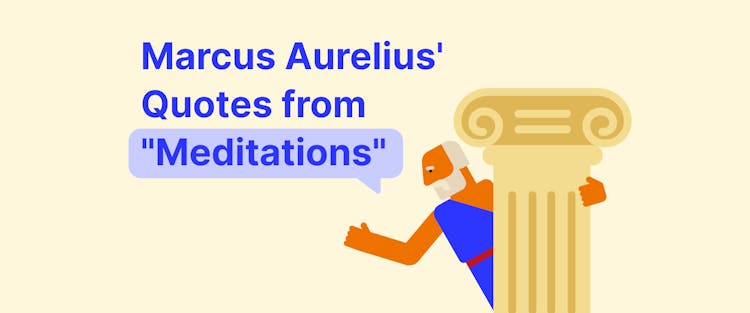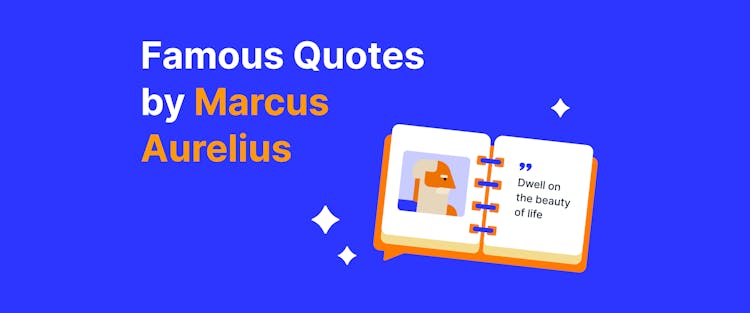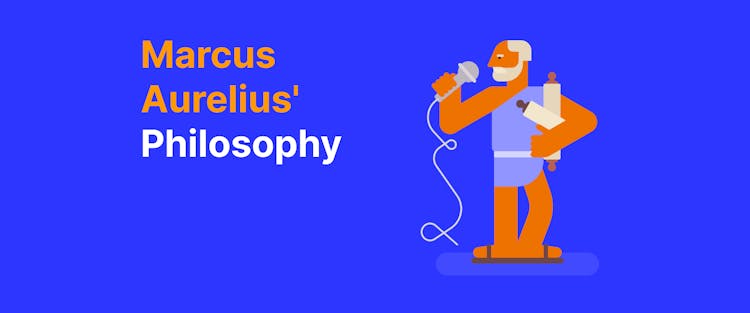Stoicism has confidently established itself in nonfiction and self-help literature, its principles resonating deeply with modern psychotherapy and personal development methodologies. Among contemporary adherents, Stoic philosophers like Marcus Aurelius are revered, and the Roman emperor is often heralded as the face of modern Stoicism.
Who was Marcus Aurelius?
Having started studying philosophy as a child, Marcus took it seriously at his 30 when he decided to become a Stoic. Since then, he practiced the daily spiritual exercises of the Stoics, trained his mind and body, restrained passions, and was completely reborn as a man and as a ruler into a person approaching the ideal of the Stoics. Aurelius systematically worked on developing wisdom and endurance, taking as his model the philosophers whose teachings he shared and the great men whom he admired, especially Antoninus. Like them, he tried to learn to face adversity with quiet dignity. Marcus observed as they lived in harmony with their minds and displayed their greatest virtues: wisdom, justice, courage, and moderation.
"Concentrate every minute like a Roman—like a man—on doing what's in front of you with precise and genuine seriousness, tenderly, willingly, with justice. And on freeing yourself from all other distractions." (Hays translation)

Marcus Aurelius Antoninus was a true representative of late Stoicism, as he also emphasized ethics more than physics or logic. To what extent did Marcus Aurelius apply the high moral and political principles we find in his "Meditations"? The answer to this question is that Aurelius' philosophy does not differ from his practical activities. In his mind, there was no antagonism between philosophy and life practice. For him, temporalia should not vary from spiritualia. However, at the same time, Marcus Aurelius is far from any utopias. Marcus Aurelius understands philosophy as a school of virtue and a way of life.
1. "Meditations" by Marcus Aurelius
Marcus Aurelius left twelve "books" written in ancient Greek, given the general title "Meditations." This work briefly shows death, freedom, and will. Could anyone have thought that a philosopher who lived in the classical period would so accurately describe the events taking place today? The ancient philosopher's aphorisms still touch everyone's soul.
According to the philosopher, morality is based on obedience to nature; it creates a quality of spirit called simplicity: a person should be simple. Also, Marcus Aurelius called to love one's enemies and created the ideal of forgiveness; he learned to see a person as a "political animal," and therefore, in his morality, a lot of space is devoted to social duties - in this, he went further than Seneca and Epictetus. In his "Meditations," Marcus Aurelius drew particular attention to the issue of death. He, like Seneca, said that death was not something terrible and sad; life itself was an eternal repetition, and death was no different from birth.
According to Ryan Holiday, the founder of the Daily Stoic community, "Meditations" by Marcus Aurelius is a remarkable work, offering a rare glimpse into the personal reflections and advice of one of history's most influential leaders. Trained in Stoic philosophy, Marcus Aurelius used nightly spiritual exercises to cultivate humility, patience, empathy, generosity, and resilience. This book is highly readable and accessible, filled with practical wisdom that can be applied to daily life. Holiday recommends Gregory Hays’ new translation in English from Modern Library for its clear and contemporary language, making it easier for readers to engage with Marcus Aurelius' profound insights.
2. "Meditations: The Annotated Edition" by Marcus Aurelius, Robin Waterfield (translator)
The translation of "Meditations" by Robin Waterfield is highly recommended for several reasons. Waterfield, known for his expertise translating Greek history and philosophy, provides an excellent rendition of Marcus Aurelius' work. This translation is informed by the latest scholarship on Marcus Aurelius and accompanied by a substantial introduction that offers valuable context and insight. Additionally, Waterfield's detailed footnotes on each page serve as helpful annotations, enhancing the reader's understanding of the text. This volume offers a well-rounded reading experience, making it a top choice among the available translations of "Meditations."
3. "The Inner Citadel" by Pierre Hadot
One of Pierre Hadot's favorite exercises is a profound reflection on the finitude of life. Awareness of the end, limit, and "crown of life" gives value and weight to the events of our life, and thus, we can, as the philosopher writes, "realize the value of the present moment," "discover the seriousness of life." "The thought of death led me to this exercise of focusing on the present, recommended by both Epicureans and Stoics."
To change the traditional reading, representing Marcus Aurelius as a pessimist, to disgust the saturated of everyday life, and you make evident what he tells us about the beauty of life, is the surprise before the world, whether philosophy should break out of everyday life or, on the contrary, to transform it. Of course, there should be a break from the routine. With Marcus Aurelius, for example, we find a desire to avoid the notions or judgments common to everyday life. While philosophy is detached from the every day, it remains inseparable from this every day.
Three rules of Marcus Aurelius' life, according to Hadot
"First, do nothing inconsiderately, nor without a purpose. Second, make thy acts refer to nothing but a social end."

The book analyzing the meditations of Marcus Aurelius is "The Inner Citadel" by Pierre Hadot. Hadot identified the three rules of Marcus Aurelius’ life with the following concepts: 1) judgment, 2) desire, and 3) urge to action.
Strive for a pure judgment of events. Marcus Aurelius realized that people made their judgments about everything. But instead of pure judgments, people make value judgments. Did your partner cheat on you? Are you sick? Did you lose money? Did people laugh at you? Did you get stabbed in the back? The events themselves can’t hurt you if you don’t let them.
In the work "Meditations," Marcus Aurelius constantly repeated to himself that most things in life were beyond his control. He only wanted what was under his control or what was happening to him. He believed in something more than himself; what happened to him wasn’t random.
Remove impulses from your life, focus your actions, never waste energy on nonsense, and have a goal.
4. "How to Think Like a Roman Emperor" by Donald Robertson
Donald Robertson, a cognitive-behavioral psychotherapist, has written extensively about Stoicism and its practical applications in modern life. Donald came across the works of the French scientist Pierre Hadot and was struck by the potential benefits of Stoic teachings, as he wrote in his book "How to Think Like a Roman Emperor." He also believed that the best way to begin learning Stoic philosophy was to emulate the example of virtue set by living people. Marcus Aurelius' life can be seen as an example of Stoicism, just as he saw the lives of his Stoic teachers, writes Robertson.
Cognitive behavioral therapy
The book is devoted to how the Emperor of the Roman Empire, Marcus Aurelius, acquired the Stoic power of the mind and ultimately achieved the profound satisfaction of his own life. In many places, Robertson combined Stoicism with elements of CPT (cognitive behavioral therapy), and it looks pretty organic because the CPT has drawn its ideas from Stoicism, and both share fundamental views of the world. Robertson explores how Marcus Aurelius' "Meditations" can be applied to daily life challenges.
During his reign, Roman emperor Marcus Aurelius faced enormous challenges. Marcus pursued failure after failure; one can imagine how he felt then. Nevertheless, he proceeded with calm confidence in the face of serious trouble. "Meditations" allows us to penetrate his soul and see how he coped with life’s difficulties. Marcus sincerely tried to transform his character into a better one instead of gaining points in intellectual competition with competitors. His family, mainly his mother, established this aspiration, resulting from the eminent teachers who took part in the education of Aurelius’ character.
Psychological stability
By teaching Marcus Stoic philosophy, Apollonius first helped him develop psychological stability through an ancient form of psychotherapy and self-improvement, sometimes called Stoic "treatment of passions." The primary cure for Marcus’ anger was Stoic virtue - kindness that, together with decency, constituted justice's most crucial social virtue.
According to Donald Robertson, Marcus often mentioned, in connection with cognitive distance, another technique we call functional analysis. It’s about thinking about the consequences of a situation where you give in to anger and a situation where you react calmly, rationally, and perhaps with empathy and kindness. Anger in response to perceived wrongs hurts us more than it hurts itself but in a more fundamental sense.
Whenever we’re insulted by another person’s flaws, Marcus’ advice is to take it as a signal to stop, immediately examine our character, and think about what we might be wrong about. The Stoic purpose of living in harmony with all humankind does not mean we should expect everyone to behave like our friends. On the contrary, we must be ready to face many challenging and vicious people in life and accept them as inevitable.
5. "Marcus Aurelius" by John Sellars
In his book "Marcus Aurelius," John Sellars presents a fresh perspective on the "Meditations" as a philosophical work, situating it within the context of Stoic philosophy, to which Marcus Aurelius was deeply devoted. Contrary to specific criticisms that Marcus was merely an eclectic thinker or that the "Meditations" lack philosophical rigor, Sellars argues that Marcus was actively engaged in a dialogue with Stoic predecessors, addressing themes from all aspects of Stoicism: logic, physics, and ethics. Sellars portrays Marcus Aurelius as a committed Stoic philosopher who explored various philosophical topics to live a virtuous life.
6. "How to Be a Stoic" by Massimo Pigliucci
In "How to Be a Stoic," philosopher Massimo Pigliucci explores the timeless quest for leading a good life, addressing the fundamental question of how to find happiness. Drawing inspiration from Stoicism, an ancient philosophy that profoundly influenced figures like the emperor Marcus Aurelius, Pigliucci argues that Stoicism offers valuable insights and practical wisdom for modern life. By embracing Stoic principles, you can navigate life's challenges with resilience, virtue, and inner peace, ultimately striving towards a more fulfilling existence.
7. "The Obstacle Is the Way: The Timeless Art of Turning Trials into Triumph" by Ryan Holiday
There are many books on success, but none teach how to survive defeat, perceive obstacles, and turn them into advantages. The essence of philosophy is conflict in action. In the ability to completely twist the obstacle of thought. In a deeper understanding of the problem and its larger context. Using the Stoics principles and inspired by the life of Marcus Aurelius, media strategist Ryan Holiday helps to see the situation as a whole and focus on what can be changed.
“In a sense, people are our proper occupation. Our job is to do them good and put up with them. But when they obstruct our proper tasks, they become irrelevant to us--like sun, wind, and animals. Our actions may be impeded by them, but there can be no impeding our intentions or our dispositions. Because we can accommodate and adapt. The mind adapts and converts to its own purposes the obstacle to our acting. The impediment to action advances action. What stands in the way becomes the way.” (Hays translation)
8. "Fronto: Selected Letters" by M. Cornelius Fronto
For a deeper historical analysis, you can discover "Fronto: Selected Letters." Contemporary readers may not be familiar with M. Cornelius Fronto. Firstly, he was not considered a prominent Latin author based on the surviving literary works from antiquity. Unfortunately, much of Fronto's acclaimed speeches have been lost over time, with only a significant fragment preserved in a letter from his student, Marcus Aurelius, who quoted his teacher's text. However, Fronto's most substantial legacy that remains today is his correspondence with members of the Antonine dynasty, including Marcus Aurelius, Lucius Verus, and Antoninus Pius. Despite challenges with the texts, Fronto's letters offer invaluable insights into his time's historical and literary landscape. They provide a unique and informal window into the lives and perspectives of influential political and intellectual figures from the second century, such as Marcus Aurelius and his mentor.
Five tips inspired by Marcus Aurelius for modern life
After understanding a little more about who Marcus Aurelius was, after reading the research of his "Meditations," especially Donald Robertson's psychological approach and Ryan Holliday's modern interpretation of the philosophy, below are some possible steps that can help you incorporate the Roman emperor's wisdom into your daily life:
"The cucumber is bitter? Then throw it out. There are brambles in the path? Then go around them. That's all you need to know." (Hays translation)

1. Think about progress, not about the ideal.
The Stoics came up with their reminder: "Don’t await the perfection of Plato’s Republic." After all, you will never achieve utopian perfection. Make the best of what you have.
"Never let the future disturb you. You will meet it, if you have to, with the same weapons of reason which today arm you against the present." (Penguin Classics edition of Meditations, translated by Maxwell Staniforth)

2. Live in the present.
Cultivate mindfulness by staying grounded in the present moment. Avoid dwelling on the past or worrying excessively about the future. By fully experiencing each moment as it unfolds, you can find greater contentment and clarity in your daily life.
"If man reflects on the changes and transformations which follow one another like wave after wave and their rapidity, he will despise everything which is perishable."

3. Practice self-reflection.
Set aside time for introspection and self-examination. Reflect on your thoughts, emotions, and behaviors with honesty and curiosity. By gaining insight into your inner workings, you can identify areas for growth and cultivate greater self-awareness.
"But true good fortune is what you make for yourself. Good fortune: good character, good intentions, and good actions." (Hays translation)

4. Maintain virtue.
Strive to live virtuously by aligning your actions with your core values. Practice integrity, kindness, courage, and wisdom in all aspects of your life.
"Self-control and resistance to distractions. Optimism in adversity—especially illness." (Hays translation)

5. Embrace adversity.
View challenges as opportunities for growth and self-improvement. Adversity can catalyze personal transformation, helping you develop strength, resilience, and wisdom in life's trials.
Why read Marcus Aurelius?
In today's world, which is shaken every day by large-scale crises—from natural disasters to pandemics and wars—each of us is looking for effective methods of maintaining mental health and combating stress. Modern philosophers rethink the ideas of their ancient predecessors, such as the emperor of Rome, Marcus Aurelius, and adapt them to the challenges of today. Stoicism is probably the only "philosophy" where primary texts are much easier and more straightforward than their subsequent scientific interpretations.
Read "Meditations" with the Headway app
Delving into Marcus Aurelius' "Meditations" is valuable and essential for a deeper understanding of Stoicism's profound philosophy. These reflections touch on the most critical universal truths we must revolve today. Existence, virtues, morality, duty, death, reason, and relations with men and gods are essential for every person. It's highly convenient to read the summary of "Meditations" with the Headway app.

